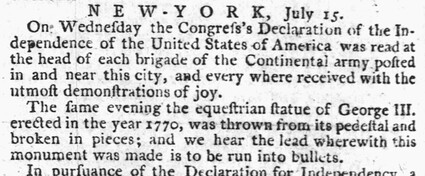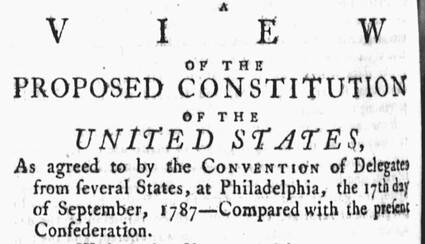Our View: The Declaration was just a starting point
June 30, 2023
The Declaration of Independence in 1776 was a start, but 10 years into the American experiment, things were fractious in the former British colonies. A move was on to develop a constitution that would galvanize the union, in a way that could stand the test of time and expected massive shifts in the makeup of the country, an effort to "form a more perfect union."
The Federalist Papers were a series of 85 essays appearing in New York newspapers in 1787 and 1788 urging the citizens of New York to ratify a United States Constitution. Written by Alexander Hamilton, James Madison, and John Jay, the papers are considered one of the most important sources for interpreting and understanding the original intent of the Constitution, and thus the endearing spirit of 1776 that we celebrate each year. The following are some excerpts from Hamilton's writings.
Federalist Paper No. 6
A man must be far gone in Utopian speculations who can seriously doubt that, if these States should either be wholly disunited, or only united in partial confederacies, the subdivisions into which they might be thrown would have frequent and violent contests with each other. To presume a want of motives for such contests as an argument against their existence, would be to forget that men are ambitious, vindictive, and rapacious. To look for a continuation of harmony between a number of independent, unconnected sovereignties in the same neighborhood, would be to disregard the uniform course of human events, and to set at defiance the accumulated experience of ages.
The causes of hostility among nations are innumerable. There are some which have a general and almost constant operation upon the collective bodies of society. Of this description are the love of power or the desire of pre-eminence and dominion--the jealousy of power, or the desire of equality and safety. There are others which have a more circumscribed though an equally operative influence within their spheres. Such are the rivalships and competitions of commerce between commercial nations. And there are others, not less numerous than either of the former, which take their origin entirely in private passions; in the attachments, enmities, interests, hopes, and fears of leading individuals in the communities of which they are members. Men of this class, whether the favorites of a king or of a people, have in too many instances abused the confidence they possessed; and assuming the pretext of some public motive, have not scrupled to sacrifice the national tranquility to personal advantage or personal gratification.
From this summary of what has taken place in other countries, whose situations have borne the nearest resemblance to our own, what reason can we have to confide in those reveries which would seduce us into an expectation of peace and cordiality between the members of the present confederacy, in a state of separation? Have we not already seen enough of the fallacy and extravagance of those idle theories which have amused us with promises of an exemption from the imperfections, weaknesses and evils incident to society in every shape? Is it not time to awake from the deceitful dream of a golden age, and to adopt as a practical maxim for the direction of our political conduct that we, as well as the other inhabitants of the globe, are yet remote from the happy empire of perfect wisdom and perfect virtue?
Let the point of extreme depression to which our national dignity and credit have sunk, let the inconveniences felt everywhere from a lax and ill administration of government, let the revolt of a part of the State of North Carolina, the late menacing disturbances in Pennsylvania, and the actual insurrections and rebellions in Massachusetts, declare!
Federalist Paper No. 7
... America, if not connected at all, or only by the feeble tie of a simple league, offensive and defensive, would, by the operation of such jarring alliances, be gradually entangled in all the pernicious labyrinths of European politics and wars; and by the destructive contentions of the parts into which she was divided, would be likely to become a prey to the artifices and machinations of powers equally the enemies of them all. Divide et impera (Divide and command) must be the motto of every nation that either hates or fears us.
Federalist Paper No. 8
This is an idea not superficial or futile, but solid and weighty. It deserves the most serious and mature consideration of every prudent and honest man of whatever party. If such men will make a firm and solemn pause, and meditate dispassionately on the importance of this interesting idea; if they will contemplate it in all its attitudes, and trace it to all its consequences, they will not hesitate to part with trivial objections to a Constitution, the rejection of which would in all probability put a final period to the Union. The airy phantoms that flit before the distempered imaginations of some of its adversaries would quickly give place to the more substantial forms of dangers, real, certain, and formidable.
Federalist Paper No. 85
The establishment of a Constitution, in time of profound peace, by the voluntary consent of a whole people, is a prodigy, to the completion of which I look forward with trembling anxiety. I can reconcile it to no rules of prudence to let go the hold we now have, in so arduous an enterprise, upon seven out of the thirteen States, and after having passed over so considerable a part of the ground, to recommence the course. I dread the more the consequences of new attempts, because I know that powerful individuals, in this and in other States, are enemies to a general national government in every possible shape.









